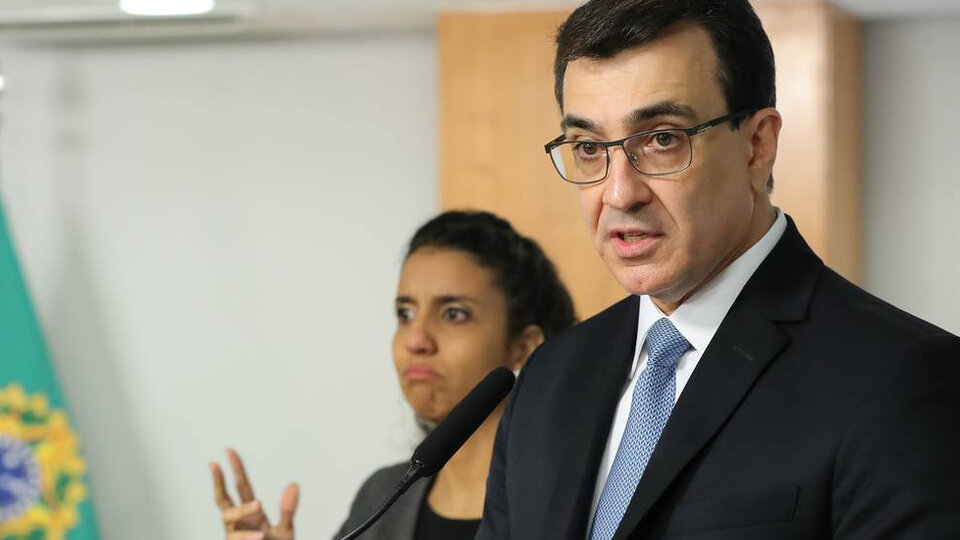
[ad_1]
Brazil has recorded more than 4,000 deaths from covid-19 in the past 24 hours, a new daily maximum, and has accumulated 336,947 deaths since the start of the pandemic a year ago. Brazil’s new foreign minister, Carlos Alberto Franco França, took office on Tuesday and admitted that the country faces an “emergency in the field of health, economy and sustainable development”. and take care of the environment.
Franco França, a 56-year-old diplomat, replaces Ernesto Araújo, who resigned last week under strong pressure from the parliamentary base which supports the government of Jair Bolsonaro, unhappy with its handling of foreign policy.
He took office in a private ceremony, along with five other new ministers appointed by Bolsonaro as part of a sweeping reform of his cabinet, and his speech was broadcast by the Foreign Ministry.
Franco França underlined the moment of the “emergencies” that Brazil is going through, among which he put in the first place the health crisis caused by the coronavirus, with more than 13 million cases. “The first emergency must be to fight the pandemic,” said the new foreign minister, who has pledged to hold “increasing consultations with governments and pharmaceutical companies” to achieve better access for the country to vaccines and to “remedies necessary for the treatment of the most serious patients”, which are rare in Brazil.
Health diplomacy
“We will be more and more engaged in genuine health diplomacy” so that foreign policy “translates into results for the lives of Brazilians”, said Franco França, a conservative diplomat but far removed from the ideological burden imposed on him by the far right Araújo. The new minister, however, admitted that “the task is not simple”, because “no one is unaware that there is a shortage of medical supplies in the world” to fight against the pandemic.
Secondly, he spoke of “the economic emergency” and declared himself in favor of a foreign policy which “contributes to create jobs”, through greater integration of the country into global production chains, with “trade openness. “growing and the search for new agreements. which open more doors to Brazilian exports.
“There is no modernization without opening up to the world and, for this reason, our foreign policy has a universalist meaning, always guided by the protection of our legitimate interests”, he declared. Finally, he spoke of “the climatic and environmental emergency”, in a tone diametrically different from that used by Araújo, who denied the phenomenon of global warming and attributed it to the “inventions” of “cultural Marxism”.
Brazil has aligned itself since Bolsonaro came to power in 2019 with Republican Donald Trump, distancing itself from other emerging countries and quarreling with China, its main trading partner.
Conversation between Bolsonaro and Putin
As a first different gesture in international relations, Bolsonaro spoke on Tuesday with his Russian counterpart, Vladimir Putin, interested in accelerating the acquisition of Sputnik V.
According to a note from the presidency, “the issues discussed were the acquisition and manufacture of the Sputnik V vaccine in Brazil, trade between the two countries, cooperation in the defense sector and in science and technology”, as well. that access to Brazilian meats in the Russian market.
Alongside Bolsonaro, attended the Minister of Health, Marcelo Queiroga, and the director of the National Agency for Health Surveillance (Anvisa), Antonio Barra Torres, whose body must authorize the use of the Russian vaccine in the country.
In Brazil, the Russian company Gamaleya, which developed the vaccine, has reached an agreement with the Unión Química laboratory, which includes the transfer of technology and the possibility of developing the drug in the country. However, Anvisa has not yet authorized the use of the Russian vaccine and has requested more detailed documents and explanations than it has already received to continue the process.
In this sense, official sources said that Minister Queiroga and Barra Torres will meet in the coming days with representatives of the Russian Embassy in the country, in order to speed up the vaccine approval process.
Even without Anvisa’s authorization, the Brazilian government has already signed on March 12 a preliminary agreement for the purchase of ten million doses of the Sputnik V vaccine from the Unión Química laboratory, which is entirely national.
According to this agreement, Brazil is expected to receive a first batch of 400,000 doses from Russia by the end of April, another 2 million in May and the remaining 7.6 million by the end of June. Forecasts from the Brazilian firm suggest that local production will begin in the middle of this year, with the capacity to manufacture around 150 million doses per year initially.
In Brazil, Chinese Sinovac vaccines are already packaged, as well as those developed by the AstraZeneca laboratory and the University of Oxford, under agreements with the Butantan Institute in Sao Paulo and the Oswaldo Cruz Foundation (FioCruz) in Rio de Janeiro, which they will produce locally in the coming months.
The Brazilian government has assured it will have enough vaccines to immunize the country’s 210 million people this year, but the process is moving slowly and so far only 10% of the population has been vaccinated.
.
[ad_2]
Source link
 Naaju Breaking News, Live Updates, Latest Headlines, Viral News, Top Stories, Trending Topics, Videos
Naaju Breaking News, Live Updates, Latest Headlines, Viral News, Top Stories, Trending Topics, Videos